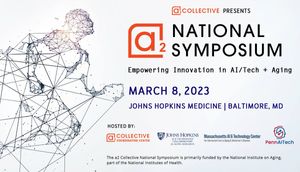Originally published by a2 Collective on March 27, 2023
This month, in Baltimore, MD, a remarkable gathering took place to harness the power of artificial intelligence (AI) and other new technologies to promote healthy aging and seek better ways to address the needs of older adults—and their families, caregivers, and communities—facing cognitive impairment, Alzheimer’s disease, and related dementias. The first-of-its-kind session brought together some of the world’s leading researchers on AI, technology, and aging, as well as investors, entrepreneurs, academics, and innovators to apply their creativity and business savvy at the earliest stages of development to tech products and programs to improve the health and well-being of older adults.
This synergy is fostered by the National Institute on Aging’s a2 Collective, an unusual federally funded program encouraging the tech sector in commercially viable approaches to aging. To date, 33 pilot projects have been selected for award by the program. Applications for funding for the next grouping of projects open on May 1, 2023. In the coming months, awardees from the second cohort of funding will be announced.
The a2 National Symposium, held on the Johns Hopkins Medical Campus on March 8, 2023, and attended by some 200 in-person and 100 virtual participants, featured more than two dozen projects from the program’s first cohort. They offered a variety of ways to apply AI and technology to aging—including use of virtual reality to facilitate social engagement, AI-assisted chat devices to assist caregivers, robotic assistants to calm bouts of dementia-induced aggression in residential centers, home-based movement sensors to predict cognitive decline, and wearable devices embedded in earbuds to monitor heart health. One project by Visilant, for remote eye screening, won a live pitch competition at the session, earning additional consults with tech startup experts and opportunities to present its product to technology venture capitalists.
The a2 Collective was established with the accelerated aging of the population in mind. A decade from now, there will be more Americans over age 65 than under 18. For many of these 77 million seniors, as well as their families and communities, advancing age will be an enormous challenge—particularly for those who will develop cognitive impairment, Alzheimer’s, and related dementias. The a2 Collective is made up of three Artificial Intelligence and Technology Collaboratories (AITCs) for Aging Research, centered at Johns Hopkins University (JH AITC), the University of Massachusetts Amherst (MassAITC), and the University of Pennsylvania (PennAITech). The a2 Collective Coordinating Center is managed by Rose Li and Associates, Inc. (RLA).
Symposium features and activities focused on technical, ethical, financial, and practical considerations in applying tech to healthcare and electronic medicine and directing projects to an older audience’s needs and capabilities. Opening the event, Elizabeth “Beth” Mynatt, PhD, an internationally recognized expert in computing and assistive technologies and Dean of the Khoury College of Computer Sciences at Northeastern University, observed that “just because you put aging researchers and AI researchers in the same room doesn’t mean they’ll give each other ideas.” Key to success in any research area like aging is to enlist “real people” in the development and application of any product at the earliest stages. In keeping with that theme, a panel discussion on AI and ethics delved into issues of trust in technology, a topic which resonated with attendees in the context of wider national discussions about the role of social media and chatbots.
Debra Mathews, PhD, MA, Assistant Director for Science Programs for the Johns Hopkins Berman Institute of Bioethics and President-Elect of the International Neuroethics Society, underscored that ethics is “encoded” into AI. Irene Chen, PhD, of the University of California Berkeley and the University of California San Francisco, noted that “biased systems lead to biased datasets and biased algorithms.” Emily Largent, PhD, JD, RN, a leader in medical ethics and health policy at PennAITech, highlighted the very real opportunities presented by these developing technologies, for example, to address such biases: “We know that there are huge disparities in the burden of dementia in African American and Hispanic communities and those groups are likely to have delayed diagnoses—so the algorithms could be transformative; we can find people sooner so that clinicians can provide crucial services and support.”
Sarah Lenz Lock, JD, AARP Senior Vice President for Policy and Brain Health, discussed both the opportunities and responsibilities that come with working in what she called the “AgeTech” space. “Many of you have a lot of power over how things are going to go for seniors in the coming years,” she noted.
Jeremy Greene, MD, PhD, MA, a historian of medicine and William H. Welch Professor of Medicine and the History of Medicine, Johns Hopkins University, provided broader perspective—pointing out a contradictory mix of hype and apprehension about technology in medicine for decades. He asked: “When a technology comes out and promises to increase equity and access to care, there’s a question: Who is making sure that it is?” The history of medical technology, he said, shows us how innovation can help people have some agency in their lives, which is crucial for aging people—and particularly those with Alzheimer’s and dementia. “Smug fatalism about technology is inappropriate,” Dr. Greene observed, “but technologies themselves are agnostic about whether they increase or decrease disparities. We need to know who follows up to make sure they are helping.”
Addressing the need for input from those who will use new technologies—including older adults, caregivers, medical and health professionals, and localities providing various types of support—the AITCs include Stakeholder Engagement Cores responsible for ensuring that AI and technologies developed under the program will be “maximally adoptable by and accessible to their end users.”
The first of an annual series, the symposium afforded plenty of networking opportunities, including introductions to sponsors, investors, and funders, as well as guided discussions at roundtables on networking and mentoring, and another on technology identification and training. The pitch competition featuring seven a2 Pilot Awardees’ novel technology solutions took place live onstage, before a panel of three judges. The winning entry from Visilant presented a product to develop a simple and inexpensive imaging and telemedicine system to allow for remote eye screening for cataracts and post-operative management. Its prize package included consultations with tech startup experts at Johns Hopkins Tech Ventures, Techstars Future of Longevity, and Hibiscus Biotechnology Ventures.

The next a2 National Symposium will be held March 19-20, 2024, on the University of Pennsylvania campus. The National Institute on Aging is one of 27 Institutes and Centers of the National Institutes of Health at the U.S. Department of Health and Human Services. As part of their mission to finance and conduct research to improve health and well-being, the NIH entities conduct programs for small business innovations in health. For more information about the a2 Collective and funding opportunities, visit the a2 Collective website.

